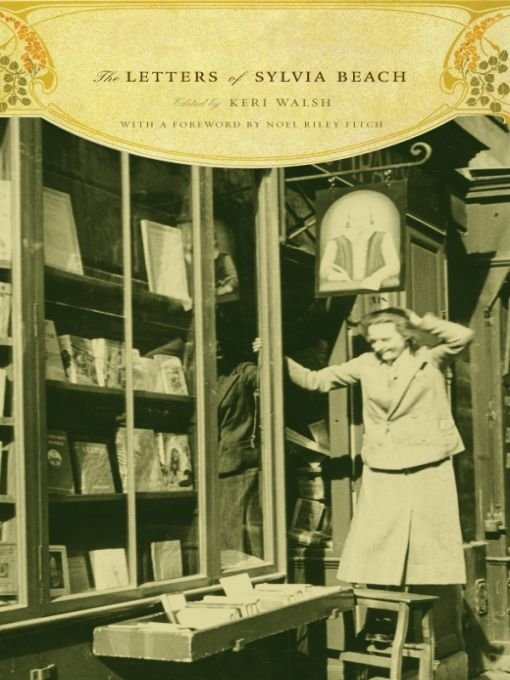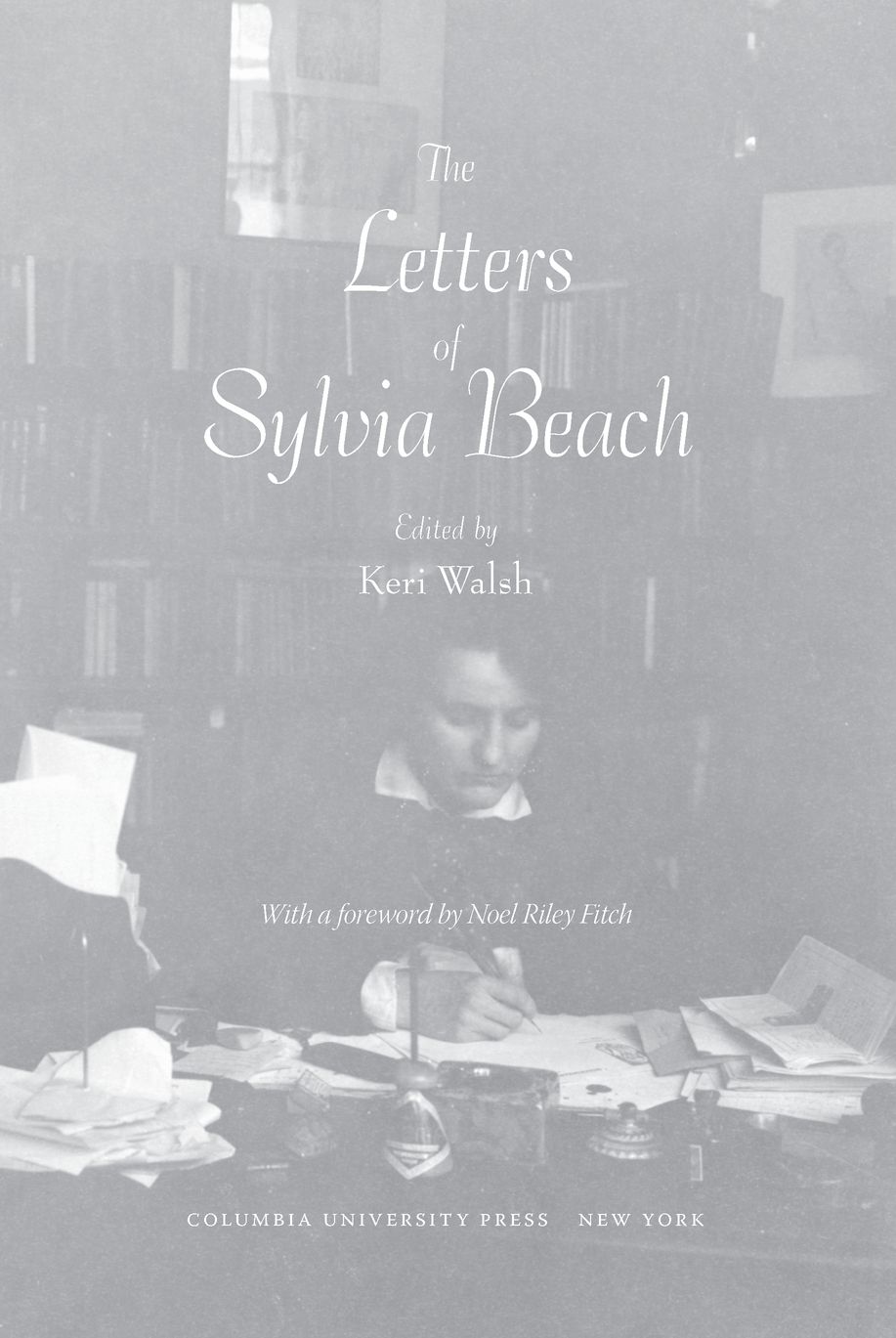Table of Contents
For Deirdre and John Walsh
LIST OF ILLUSTRATIONS
Photo insert falls between pages 124 and 125
1. Sylvia Beach, aged 15
2. Sylvia and Holly Beach dancing a tarantella in traditional dress in Italy
3. Beach as agricultural worker, France, during World War I, with unknown colleague
4. Cyprian Beach, silent film actress
5. Eleanor Orbison Beach by the Seine
6. Sylvester Woodbridge Beach, in Princeton gown with tipped hat, pays last respects to Woodrow Wilson (February 6, 1924)
7. Looking down the rue de lOdon to the Odon Theater
8. Beach attending to the window at Shakespeare and Company
9. Beach spotting George Antheil as he climbs to his apartment
10. Bookplate with Shakespeare and Company logo
11. Please return card, Shakespeare and Company
12. Beach at her desk, Paris
13. A definitive portrait of Beach
14. Sylvia Beach, Shakespeare and Company, rue de lOdon
15. Beach and her assistant Myrsine Moschos
16. Adrienne Monnier at her desk
17. Adrienne Monnier reading, Maison des Amis des Livres
18. Sylvia and Adrienne at Monnier family farm, Savoy
19. Bryher (Annie Winifred Ellerman, 1894-1983)
20. H.D. (Hilda Doolittle, 1886-1961)
21. Invoice showing Ernest Hemingways borrowings (March 24, 1934)
22. Beach and James Joyce at Shakespeare and Company
23. Beach at threshold of Shakespeare and Company holding Collected Plays of Shakespeare
24. Beach after the Liberation of Paris, displaying an American flag in her apartments window
25. Ernest Hemingway chez Sylvia Beach aprs la Libration
26. To Sylvia Beach, Sincerely Yours Richard Wright, June 7, 1946 Paris
27. Maurice Saillet (1914-1990), Monniers assistant, friend to Beach and Monnier
28. Jackson Mathews, 1907(?)-1978
29. Beach receiving her Honorary Doctorate at SUNY Buffalo
30. Beach in James Joyces Tower at Sandycove, Dublin
FOREWORD
Noel Riley Fitch
SYLVIA BEACH was the midwife of literary modernism. Certain people are meant to be midwivesnot mothers of invention. Sylvia was one. Through her Paris bookshop, Shakespeare and Company, she published James Joyces Ulysses, running interference with the printer so that he could rewrite and add at least a third more of his novel to the renewable proofs. She spent a decade promoting and caring for his business and reprints of the novel, and presented him to the leading men of letters in France.
Beachs contribution to modernism went far beyond what she did for Joyce, for she created and presided over a literary center, serving as librarian, promoter, and sometimes banker and broker for many established and aspiring writers. She introduced William Carlos Williams to Valery Larbaud, F. Scott Fitzgerald to Andr Chamson, and Eugne Jolas to James Joyce. In short, she orchestrated many of the transactions between English and French literature during the first half of the twentieth century.
She was a missionary to the arts or a midwife, though Sylvia herself usually used masculine and business terms, calling herself a businessman. Despite her self-designation, her casual bookkeeping and generosity made her anything but a keen moneymaking commercial businessman. For twenty-two years, like a Geneva Calvinist, she worked in the arts and lived over the store. She also called it my literary welfare work and once she indeed called the shop my missionary endeavor. In my experienced opinion as a ministers child myself, I see her as a good ministers daughter (if you discount her atheism). She knew how to keep a secret; knew how to take up a collectionfrom the wealthy, for the poor (artists); and devoted her life to something greater than herself.
Before my Sylvia Beach and the Lost Generation was published, few people had studied the women artists who lived and worked in Paris in the first half of the twentieth century, and no one had told the story of the woman and bookshop that presided over this literary crossroads. Literary history had ignored her.
One of the early discoveries I madeand I think that Sylvia Beach and the Lost Generation helped to shift critical interpretation in this directionwas that it was the modernist women who as pioneers led the way to Paris: Natalie Barney in 1902, Gertrude Stein in 1903, Edith Wharton in 1912, Beach in 1916. It was the women who stayed the longest (three of these four died there). It was the women who made a room of their own, learned the language, and occasionally wrote in French. Wharton wrote a short story in French, all of Barneys poetry was written in French, Beach translated Henri Michaux Barbare en Asie into English. Modernism was at least as much a creation by the women as by the men, and certainly it was the women who nurtured the new.
In the twenty-five years since Beachs story was published, numerous books about the women of modernism have appeared, from monographs on Barney and Stein to such sweeping studies as Shari Benstocks Women of the Left Bank.
Shakespeare and Company and Sylvia Beach were one and the same. Their success and endurance resulted primarily from the force of her personality, which was characterized as much by her hospitality and loyalty (the quality Ernest Hemingway most admired) as by her sharp wit and verbal playfulness. Her friends told me that in her speech she tripped through and delightedly combined the English and French languages.
This personality and wit stand revealed in the letters contained in this book, especially in the earlier letters to family and friends before she became so busy that her correspondence was chiefly business. The letters in this volume reveal her personal voice, the important role her family played in establishing the bookshop, the details of her bootlegging of Ulysses, and her working relationship with Adrienne Monnier.
This first collection of her letters, carefully edited by Keri Walsh, completes the story of Beachs missionary zeal and her role in modernism. Sheand the company of notables foregathered at Shakespeare and Companyaltered the course of modern literature.
ACKNOWLEDGMENTS
MY FIRST thanks go to Sylvia Beachs nephew, Fred Dennis, with whose permission Beachs letters appear here. Don Skemer, Princetons Curator of Manuscripts, welcomed me into the Sylvia Beach Papers and shared his deep knowledge of expatriate Paris. Archivists seem universally to share my love of Sylvia Beach, and working with them was one of the greatest pleasures of this project. AnnaLee Pauls and Meg Rich, two extraordinary research librarians, facilitated this edition and became friends in the process, as did Linda Bogue, Mary George, Charles Greene, Chris Kitto, John Logan, Aaron Pickett, Jane Snedeker, and Sylvia Yu. Thanks to Peter Nelson at Amherst College; Naomi Saito at the Beinecke Rare Book and Manuscript Library (Yale University); Erika Ledermann and Michael Basinski at SUNY Buffalo; Elizabeth Garver and Richard Workman at the Harry Ransom Center (University of Texas at Austin); the British Library; Georgetown University; Houghton Library (Harvard University); the Historical Society of Pennsylvania; the Lilly Library (Indiana University); the Huntington Library; and the Zurich International James Joyce Foundation, as well as Mauro Piccicinni and Charles Amirkhanian for assistance with George Antheil materials.












